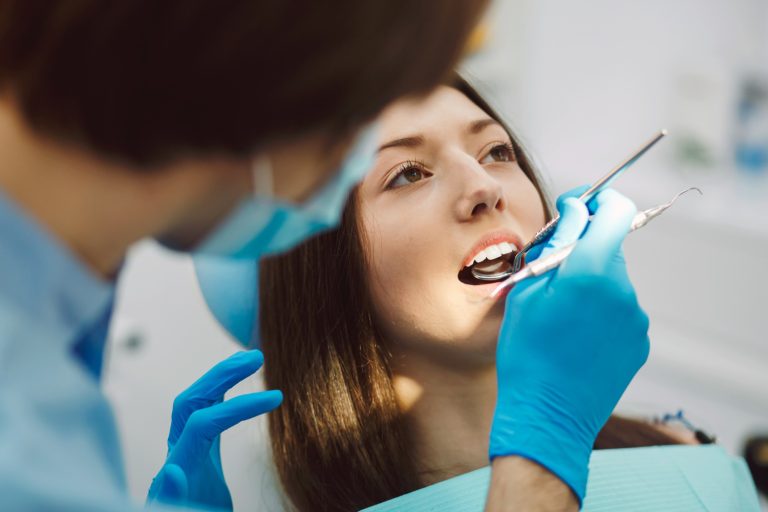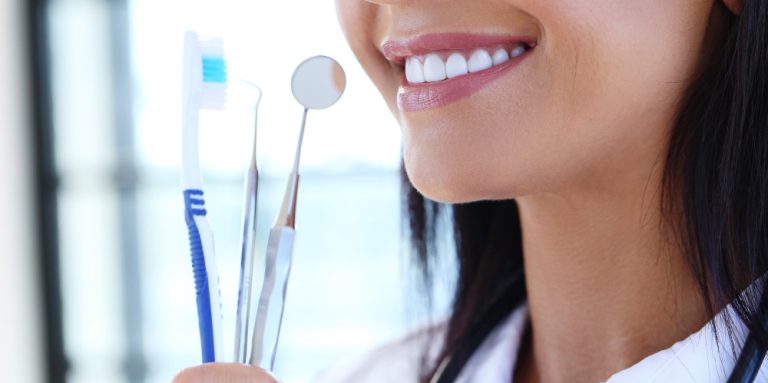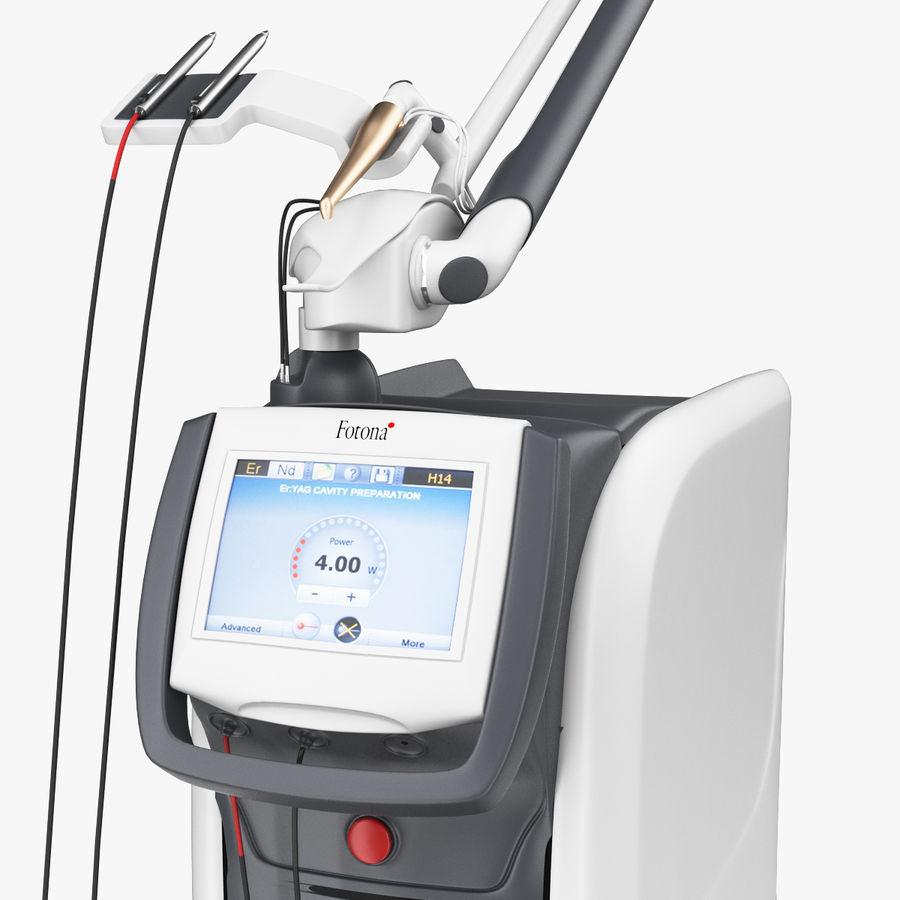
Oral cancer is a significant medical illness that sometimes goes undiagnosed in its early stages. Because it can develop quietly and swiftly, early identification is critical. Regular oral cancer screenings, which are commonly performed by dentists during standard check-ups, are critical in detecting early indications before they progress to advanced or life-threatening levels. Understanding the advantages of these screenings helps persuade people to include them as part of their overall healthcare practice.
- Early Detection Saves Lives
One of the most significant benefits of routine oral cancer screenings is the ability to detect anomalies early on. Early detection of oral cancer significantly increases the likelihood of successful therapy. Early identification can eliminate the need for severe therapies and lower the chance of cancer spreading to other parts of the body.
- Quick, Painless, and Non-Invasive
Many people underestimate the importance of oral cancer screenings because they think they are complicated or uncomfortable. In truth, the procedure is simple, quick, and painless. Dentists visually inspect the mouth, throat, tongue, gums, and surrounding tissues for any odd changes. Some may employ specialized lights or instruments, but the operation is non-invasive and stress-free for the patient.
- Identifies Small Changes Before They Become Serious
Regular screenings assist Dr. Borham in detecting minor problems, such as odd patches, sores, tumors, or tissue changes, that may not be obvious or recognizable to patients. Detecting these symptoms early allows for rapid follow-up, which can prevent mild irregularities from progressing to major health problems.
- Helps Detect Other Oral Health Issues
In addition to cancer, examinations can reveal other oral diseases that need to be addressed. Lesions, infections, and precancerous alterations are all detectable early. This not only helps to improve dental health, but it also ensures that any underlying health issues are addressed before they develop.
- Increased Protection for High-Risk Individuals
Tobacco usage, high alcohol intake, prolonged sun exposure, HPV infection, and a family history of cancer are all risk factors for developing oral cancer. Individuals who fall into these high-risk categories require regular tests. Frequent monitoring adds an additional degree of security and comfort of mind.
- Supports Overall Health and Well-Being
Oral cancer screenings do more than only identify cancer; they also improve general health. The mouth frequently reflects the state of the body, and dentists can detect indicators of systemic problems such as nutritional deficits or immunological illnesses. Regular screenings encourage a proactive attitude to health maintenance.
Maintaining dental and overall health requires routine testing for oral cancer. They are rapid, simple, and very successful in identifying early indicators of cancer and other oral diseases. You can greatly increase your chances of early identification, effective treatment, and long-term well-being by making these screenings a priority, particularly for people with greater risks.
Schedule frequent dental exams to catch any problems before they become emergencies.
Call us right now to schedule an appointment if you would like to maintain good dental health with regular checkups and cleanings.

Stress has a wide range of effects on the body, including headaches, muscle tension, sleep issues, and exhaustion. Teeth grinding, commonly known as bruxism, is a lesser known but highly prevalent side effect of stress. Many people grind or clench their teeth without realizing it, especially when sleeping, and stress is a major contributor to this behavior.
What Is the Definition of Teeth Grinding?
Teeth grinding (bruxism) is when a person unintentionally clenches their jaw or grinds their teeth together. It can occur during the day (awake bruxism) or at night (sleep bruxism). Because sleep bruxism occurs without awareness, many people only learn about it after a dentist sees damaged teeth or they have symptoms such as jaw pain or headaches.
How Stress Causes Teeth Grinding?
Stress triggers the body’s “fight or flight” reaction, which increases muscle tension throughout the body, including the muscles in the jaw. When stress persists, this tension might become habitual. During the day, stress might trigger jaw clenching due to concentration, frustration, or anxiety. At night, the brain may continue to process stress, resulting in involuntary teeth grinding.
Bruxism is frequently associated with emotional stress, anxiety, school or work-related pressure, and big life events. People who are stressed or have trouble relaxing are more likely to adopt this habit.
Role of the Nervous System
Stress impacts the neurological system, which regulates muscular action and sleep patterns. When the nervous system is overstimulated, it disrupts regular sleep cycles and increases muscular activity when asleep. This explains why teeth grinding is typically associated with other stress-related sleep problems, such as insomnia or restless sleep.
Signs and symptoms of stress-related bruxism
Teeth grinding can result in a range of symptoms, including:
- Jaw ache or tightness.
- Headaches, particularly in the morning.
- Tooth sensitivity.
- flattened, chipped, or worn teeth
- Facial soreness
- Making clicking or popping sounds with the jaw
If left untreated, chronic bruxism can cause long-term tooth damage and jaw joint difficulties.
Why Stress Makes It Worse Over Time?
Stress-induced tooth grinding can become a cycle. Stress induces grinding, which causes discomfort and poor sleep, and a lack of rest raises stress levels even further. If the underlying stress is not handled, this cycle can increase the frequency and severity of symptoms over time.
Managing Stress to Reduce Teeth Grinding.
Because stress is a primary trigger, regulating it is a critical step toward reducing teeth grinding. Useful strategies include:
- Practice relaxation techniques such as deep breathing or mindfulness.
- Having a steady sleep habit
- Reducing screen time before bed.
- Staying physically active.
- Identifying and addressing daily stressors.
Dentists may recommend a mouth guard to protect the teeth during nighttime grinding, but long-term recovery requires stress management.
When to Seek Help:
If teeth grinding causes pain, sleep issues, or visible tooth damage, you should see Dr. Borham. Dr. Borham can assess whether stress is a problem and provide appropriate therapies or coping strategies.
The link between stress and tooth grinding is substantial and well-established. Stress raises muscle tension and impairs sleep, making teeth grinding more likely. Individuals who realize this link and take actions to minimize stress can protect their teeth, reduce discomfort, and enhance general well-being. Stress management not only benefits the mind, but it can also improve oral health significantly.
Schedule frequent dental exams to catch any problems before they become emergencies.
Call us right now to schedule an appointment if you would like to maintain good dental health with regular checkups and cleanings.

Probiotics, best known for their function in gut health, are living bacteria that give health advantages when taken in sufficient quantities. In recent years, research has emphasized their potential to improve dental health. The oral cavity has a complex microbial community and keeping it balanced is critical for avoiding dental problems including caries, periodontal disease, and halitosis. Probiotics are a promising natural technique for maintaining this equilibrium and improving dental hygiene.
One of the primary ways probiotics benefit dental health is by fighting bad microorganisms. Dental illnesses frequently begin when harmful bacteria, such as Streptococcus mutans, cling to tooth surfaces and create biofilms or dental plaque. Lactobacillus and Bifidobacterium species are probiotics that produce antimicrobial compounds such as lactic acid, hydrogen peroxide, and bacteriocins, which can limit pathogen growth. This produces a less favorable habitat for pathogenic bacteria, resulting in a healthier oral microbiome.
Probiotics can also help the body’s natural defenses by increasing the immunological response in the mouth. They may, for example, stimulate the production of immunoglobulin A (IgA), an antibody that is critical for immunological activity on mucosal surfaces. Probiotics can reduce inflammation by modifying the host immune system, which is especially effective in the treatment of periodontal disease, an inflammatory illness that affects the gums and supporting structures of teeth.
Probiotics have also demonstrated efficacy in treating halitosis, or bad breath, another prevalent oral health issue. Anaerobic bacteria in the mouth produce volatile sulfur compounds (VSCs), which are the main cause of halitosis. A discernible improvement in breath freshness can result from the reduction of these bacteria by specific probiotic strains.
Probiotics can be delivered in a variety of ways to improve oral health, such as mouthwash, dairy products, lozenges, and chewing gum. Frequent usage of these items has been linked to better gum health, less plaque buildup, and a decreased risk of cavities. However, a number of variables, including the strain, dosage, and length of usage, affect how effective probiotics are.
Probiotics should not be seen as a substitute for traditional oral hygiene procedures including brushing, flossing, and professional dental care, despite their apparent advantages. Instead, they ought to be viewed as an adjunctive strategy that can improve general oral health. The best probiotic strains and their long-term effects on dental health require further investigation.
In summary, by suppressing dangerous bacteria, boosting immune responses, and lessening foul breath, probiotics significantly contribute to the promotion of oral health. They are a desirable complement to preventive dental treatment because of their organic, non-invasive manner of action. Probiotics may become a standard component of oral healthcare regimens as scientific knowledge advances, assisting people in maintaining a more balanced and healthier oral microbiota.
Schedule frequent dental exams to catch any problems before they become emergencies.
Call us right now to schedule an appointment if you would like to maintain good dental health with regular checkups and cleanings.

All About Enamel Erosion: Causes and Prevention
Your teeth’s hard outer layer, or tooth enamel, is essential for shielding them from environmental factors like chemicals and high temperatures as well as normal wear and tear. Even though enamel is the strongest material in the human body, it can nevertheless break. When this protective layer erodes, the sensitive dentin beneath is exposed, leading to enamel erosion, a common dental problem. Maintaining strong and healthy teeth requires an understanding of the causes of enamel erosion and how to prevent it.
Causes of Enamel Erosion
Acid exposure on a regular basis is one of the main reasons for enamel degradation. Acidic meals and drinks, including wine, soda, citrus fruits, and sports drinks, can erode enamel over time. If taken in excess or without following good dental hygiene procedures, even nutritious options like orange juice or lemon water might cause erosion.
Gastroesophageal Reflux Disease (GERD), which causes stomach acid to enter the mouth, particularly when you’re sleeping, is another important culprit. In a similar vein, chronic vomiting and bulimia introduce stomach acids that, over time, can cause significant enamel erosion.
Additionally, xerostomia, or dry mouth, can hasten the loss of enamel. Because saliva serves as a natural barrier against oral acids, enamel is more vulnerable to acid assault when saliva levels are low. Medication side effects, certain illnesses, or just dehydration might cause this syndrome.
Too much brushing or the use of a toothbrush with strong bristles can mechanically erode enamel. Furthermore, bruxism, also known as teeth grinding, which frequently happens while you are sleeping or as a result of stress, puts too much strain on your teeth and causes enamel loss.
Symptoms of Enamel Erosion
Increased tooth sensitivity, particularly to hot, cold, or sweet meals, is one of the early indicators of enamel erosion. As the enamel thins and the underlying dentin show through, teeth may appear more yellow. Teeth may become chipped, rough, or rounded under extreme situations.
Prevention Tips
Good oral hygiene habits and dietary adjustments are key factors in preventing enamel erosion. It is important to limit acidic foods and beverages. When you do eat them, rinse your mouth with water afterward and use a straw to reduce contact with your teeth. Since enamel is momentarily weakened and more prone to injury after eating acidic foods, avoid brushing right after.
To preserve enamel while cleaning, use fluoride toothpaste and a soft-bristled toothbrush. Fluoride can help remineralize early erosion and strengthen enamel. For further protection, Dr. Borham could also suggest remineralizing chemicals or fluoride treatments.
Maintaining proper hydration is essential for promoting salivation. Saliva flow can also be stimulated by chewing sugar-free gum. To manage the underlying disease, get medical help if you have GERD or frequently throw up.
Finally, harm from teeth grinding while you sleep can be avoided by wearing a night guard. Frequent dental examinations are necessary to detect early indicators of enamel erosion and receive tailored guidance from Dr. Borham.
Schedule frequent dental exams to catch any problems before they become emergencies.
Call us right now to schedule an appointment if you would like to maintain good dental health with regular checkups and cleanings.

Millions of people worldwide suffer from diabetes, a chronic illness marked by elevated blood sugar levels brought on by insufficient insulin synthesis or usage. Fewer people are aware of the substantial link between diabetes and dental health, despite the fact that its effects on general health are well known. Diabetes that is not well controlled can damage your teeth and gums, resulting in complications that worsen your general health problems. It is essential to comprehend this connection in order to manage diabetes and provide good oral hygiene.
The Connection Between Diabetes and Oral Health
Diabetes impairs immunity, which makes it more difficult to fight off infections, especially oral ones. High blood sugar levels provide bacteria with the perfect environment to grow, which raises the risk of gum disease and cavities. In instance, periodontitis, a severe form of gum disease that can result in tooth loss, is more common in people with uncontrolled diabetes. Diabetes can also cause xerostomia, or dry mouth, which lowers salivary flow. The absence of saliva increases the risk of dental decay and gum discomfort since it is essential for washing away food particles and neutralizing acids.
Common Oral Health Problems in Diabetics
- Gum Disease: People with diabetes are more likely to have severe cases of gingivitis and periodontitis. Untreated infections can harm the jawbone, and inflamed gums can bleed easily.
- Dry Mouth: An increased risk of cavities, pain, and foul breath can result from low saliva production caused by high blood sugar levels.
- Oral infections: Thrush, a fungal illness brought on by Candida albicans, is one of the oral diseases that diabetics are more likely to get.
- Delayed Healing: It is more difficult to recover from oral procedures or injuries when blood sugar levels are high because they hinder wound healing.
Managing Oral Health with Diabetes
To minimize the impact of diabetes on oral health, follow these essential tips:
- Control Blood Sugar Levels: The key to preserving dental health is efficient diabetes treatment. Gum disease and other dental issues are less likely to occur when blood sugar levels are kept within the desired range.
- Keep Up a Sturdy Oral Hygiene Practice: To get rid of plaque, brush and floss your teeth at least twice a day using fluoride toothpaste. To lessen bacteria, think about using an antiseptic mouthwash.
- Visit your dentist on a regular basis: Early detection and treatment of oral health issues are made possible by routine dental examinations and cleanings. Inform your dentist Dr. Borham that you have diabetes so that they can adjust your treatment.
- Keep Yourself Hydrated: Water helps remove bacteria and food particles from your mouth and helps fight dry mouth. Lozenges or gum without sugar may also increase salivation.
- Avoid Tobacco Products: Smoking damages blood flow to the gums, which makes healing more challenging, and raises the chance of gum disease.
Diabetes and dental health are closely related conditions that frequently affect each other. People with diabetes can greatly lower their risk of dental issues by controlling their blood sugar levels and practicing good oral hygiene. Making oral health a priority not only safeguards your teeth and gums but also helps control diabetes more effectively overall, resulting in a happier, more self-assured smile.
Schedule frequent dental exams to catch any problems before they become emergencies.
Call us right now to schedule an appointment if you would like to maintain good dental health with regular checkups and cleanings.

Cosmetic dentistry has long been associated with the creation of a flawless smile, but its advantages go far beyond appearances. In today’s environment, when appearances are important for self-esteem and social interactions, cosmetic dentistry provides a transforming solution for achieving not just a beautiful smile but also a more young and energetic appearance.
The process of aging is unavoidable and causes noticeable changes, particularly in the face and mouth. Common aging symptoms that can affect facial symmetry and provide the appearance of age include dental discoloration, worn enamel, gum recession, and tooth loss. A variety of procedures offered by cosmetic dentistry can effectively reverse the effects of these problems and improve a person’s appearance.
- Brightening Your Smile
Tooth discoloration is among the most prevalent issues that people face as they become older. Teeth that have been exposed to coffee, tea, and other staining chemicals for years may appear yellowed and lifeless. Restoring the brightness of your teeth and giving your smile a more youthful appearance can be accomplished quickly and effectively with professional teeth whitening. Furthermore, discolorations can be concealed, and a genuinely radiant appearance can be achieved using dental veneers, which are thin shells of porcelain or composite resin.
- Restoring Dental Structure
Natural erosion, clenching, and grinding can all cause teeth to deteriorate over time. In addition to impairing functionality, this makes the face appear sunken. In order to improve facial proportions and support the lips and cheeks for a fuller, younger appearance, cosmetic procedures such as dental bonding and crowns can restore the size and shape of teeth.
- Replacing Missing Teeth
Significant structural alterations to the face brought on by missing teeth might result in drooping skin and an early aging appearance. Bridges and dental implants are efficient ways to replace lost teeth. In example, implants replicate the structure of natural teeth and support the stability of the jawbone, which is essential for maintaining facial form.
- Enhancing Gum Health
Gum recession, a frequent occurrence with age, can make teeth appear longer and create an uneven grin. Cosmetic gum contouring or grafting can restore gumlines, resulting in a more harmonious smile and safeguarding the teeth from future problems. Healthy gums are vital for both dental aesthetics and general face symmetry.
- The Psychological Boost
The advantages of cosmetic dentistry go beyond physical enhancements. A revitalized smile can boost self-esteem and confidence, helping people to be more open in social and professional situations. This psychological boost frequently translates into a general impression of youth and vitality.
Cosmetic dentistry is more than simply a means of getting a beautiful smile; it is a comprehensive approach to improving one’s look and regaining a youthful air. Modern cosmetic dentistry operations provide a comprehensive solution to counteract the visual indications of aging, including whitening discolored teeth, repairing lost tooth structure, and treating gum health. In a world where first impressions count, improving your smile can make you look and feel years younger. With the help of a qualified cosmetic dentist like Dr. Borham, you can achieve a youthful, bright appearance.
Schedule frequent dental exams to catch any problems before they become emergencies.
Call us right now to schedule an appointment if you would like to maintain good dental health with regular checkups and cleanings.

Millions of people suffer from temporomandibular joint (TMJ) issues, which cause discomfort, pain, and difficulty with daily activities such as chewing, speaking, and sleeping. The TMJ joins the jawbone and skull, allowing the mouth to move. Issues with this joint can have a significant impact on dental health, affecting the quality of the teeth, bite, and oral hygiene.
Understanding TMJ Disorders
The term “TMJ disorders” describes a collection of illnesses that make the jaw joint and the muscles that regulate jaw movement painful and dysfunctional. Jaw pain, popping or clicking noises, trouble opening and shutting the mouth, and headaches are some of the symptoms. Genetics, arthritis, jaw trauma, bruxism, and misaligned bites are some of the factors that can lead to TMJ disorders. Prolonged stress can also make these symptoms worse by causing jaw clenching and muscular tightness, which can put additional strain on the TMJ.
Impact of TMJ Disorders on Dental Health
TMJ issues can have a significant impact on oral health. One of the most prevalent outcomes is tooth wear caused by bruxism, which is frequently associated with TMJ issues. Excessive grinding and clenching can erode dental enamel, resulting in sensitivity, fractures, and even tooth loss over time. Furthermore, misaligned bites caused by TMJ issues can put uneven pressure on specific teeth, causing early wear, gum recession, and difficulties maintaining adequate dental hygiene.
In more extreme cases, TMJ abnormalities can cause jaw alignment issues, resulting in an unbalanced bite. This imbalance might lead some teeth to carry greater force than others, leaving them vulnerable to breakage and misalignment. As a result, additional dental procedures such as braces, crowns, or even reconstructive surgery may be required to restore balance and prevent future issues.
Diagnosis of TMJ Disorders
For TMJ issues to be effectively managed, an accurate diagnosis is essential. TMJ disorders are usually diagnosed by dentists and other medical professionals using a combination of physical examinations, patient histories, and imaging studies such as CT, MRI, or X-rays. During a physical examination, Dr. Borham will measure the jaw’s range of motion and listen for any popping, clicking, or soreness in the jaw joint.
Advanced imaging aids in detecting problems with the surrounding muscles or joint structure in more chronic instances. Early diagnosis minimizes the long-term effects on dental health and general well-being by enabling the creation of a customized treatment strategy.
Relief and Treatment Options
Medical interventions, dental procedures, and lifestyle modifications are all part of the management of TMJ disorders. Simple changes like eating softer foods, using ice or heat packs, and doing jaw exercises can frequently provide initial relief. Relaxation exercises and meditation are two stress-reduction strategies that can assist in lessening clenching and tension in the jaw.
Custom mouthguards or splints can be useful in protecting teeth and easing jaw strain in situations where clenching and grinding are major contributing factors to the disorder. Orthodontic treatment may be required to straighten the bite and decrease joint pressure in cases where misalignment is a contributing issue.
Medical treatments including muscle relaxants, anti-inflammatory drugs, or even corticosteroid injections may be recommended to reduce pain and inflammation in more severe or long-lasting cases. Usually saved for situations in which no other treatment has worked, surgical procedures are seen as a last option.
Schedule frequent dental exams to catch any problems before they become emergencies.
Call us right now to schedule an appointment if you would like to maintain good dental health with regular checkups and cleanings.

Dental restorations, such as bridges, implants, crowns, or fillings, are essential to preserving your smile’s beauty and functionality. To guarantee that these restorations remain as long as possible, you must take the same care as you would with your natural teeth. You can preserve your investment and have a confident, healthy smile for many years to come with the correct care.
Here are some vital pointers to assist you properly take care of your dental restorations.
-
Maintain a Consistent Oral Hygiene Routine
The key to maintaining dental restorations is an extensive and regular oral hygiene regimen. Using fluoride toothpaste and a toothbrush with soft bristles, brush your teeth at least twice a day. It is important to keep your teeth clean on all surfaces, even the ones around your restorations, as plaque can still accumulate there and lead to decay or gum disease. Remember to floss every day. Food particles can occasionally become trapped in dental restorations; thus, flossing keeps the area clean and reduces gum inflammation.
-
Avoid Chewing on Hard Objects
Although dental restorations are made to resist typical biting forces, they are not unbreakable. Avoid chewing on hard items like pen caps, hard candies, or ice to prevent chipping or cracking. These behaviors may erode your restorations, resulting in cracks or other damage that may need pricey replacements or repairs. Try not to open things with your teeth either, as this can damage your dental work.
-
Address Teeth Grinding (Bruxism)
Your dental restorations may sustain significant damage over time if you grind your teeth, a condition known as bruxism. Grinding puts too much pressure on dental restorations and natural teeth, which can cause wear, fractures, and loosening of fillings or crowns. See your dentist, Dr. Borham, about using a nightguard to save your teeth. By putting a barrier between your upper and lower teeth, this specially made appliance reduces the effects of grinding and shields your restorations from damage while you sleep.
-
Visit Your Dentist Regularly
Regular dental examinations are crucial for keeping an eye on the state of your restorations and identifying any problems early. Dr. Borham will inspect your restorations for signs of wear, damage, or decay, and might offer treatments or changes if necessary. In addition to lowering the risk of gum disease and decay, professional cleanings every six months help eliminate tartar and plaque buildup that can collect around your restorations. Maintaining the lifespan of your restorations and your general oral health depends on routine dental appointments.
-
Watch What You Eat and Drink
Dental restorations may get discolored or damaged by specific meals and drinks. Drinking too many dark-colored drinks, such as tea and coffee, will eventually discolor your restorations. Citrus fruits and soda are examples of acidic meals and beverages that can erode the bonding materials in crowns and fillings, increasing their susceptibility to injury. Maintaining the strength of your teeth and restorations as well as your overall health can be achieved by eating a well-balanced diet high in vitamins and minerals.
Conscious habits, routine dental checkups, and proper oral hygiene are all necessary for maintaining your dental restorations. You may prolong the life of your restorations and have a bright, healthy smile for many years to come by using these suggestions.
Schedule frequent dental exams to catch any problems before they become emergencies.
Call us right now to schedule an appointment if you would like to maintain good dental health with regular checkups and cleanings.

Saliva, which is sometimes disregarded in conversations about dental health, is essential for preserving the structure and well-being of our teeth and gums. This seemingly straightforward fluid aids in digestion and prevents disease, making it a sophisticated and crucial part of dental hygiene.
Here is how saliva keeps your smile safe and why it is so important for dental health in general.
-
Natural Defense Against Tooth Decay
The mouth’s first line of defense against tooth decay is saliva. It has vital minerals including fluoride, phosphate, and calcium that aid in the remineralization of dental enamel. In order to treat dental decay in its early stages before it becomes a cavity, remineralization is essential. Insufficient saliva would make teeth much more susceptible to bacterial acid production, which would hasten decay and cause dental issues.
-
Lubrication and Protection
Saliva serves as a barrier to protect the oral tissues by keeping the mouth wet, which is one of its main purposes. This lubricant keeps the soft tissues from drying up and cracking, which can cause discomfort, infections, and sores. Saliva also plays a vital function in preserving dental comfort and health by creating a thin coating that protects teeth from dangerous substances including food particles, bacteria, and acids.
-
Aiding in Digestion
Food particles are broken down by saliva even before they reach the stomach, which starts the digestive process. It has enzymes that initiate the breakdown of carbohydrates, like amylase. This helps with digestion and prevents food particles from staying in the mouth too long, which can lead to the development of plaque and tooth damage.
-
Antibacterial Properties
Lactoferrin, peroxidase, and lysozymes are just a few of the antibacterial substances found in saliva that work to reduce the number of germs in the mouth. These substances function by preventing the formation of pathogenic bacteria that lead to oral health conditions such periodontitis, gingivitis, and foul breath. Saliva contributes to the maintenance of a healthy balance in the oral microbiome, which is essential for avoiding infections and preserving fresh breath, by regulating the bacterial load.
-
Healing and Tissue Repair
Growth factors found in saliva aid in the restoration of the mouth’s soft tissues. For people with ailments like oral ulcers, cuts, or burns, this is especially crucial. Saliva contains proteins that help regenerate and repair oral tissues, hastening the healing process and lessening discomfort.
Schedule frequent dental exams to catch any problems before they become emergencies.
Call us right now to schedule an appointment if you would like to maintain good dental health with regular checkups and cleanings.

Tooth extraction is a frequent dental treatment in which the tooth is taken out of its bone socket. Even though it could seem overwhelming, being prepared and knowing how to take care of yourself after extraction will help guarantee a quick and easy recovery. This thorough guide will assist you in navigating the procedure.
Why You Might Need a Tooth Extraction
Tooth extractions are performed for various reasons, including:
-
Severe Decay or Infection: In order to stop the infection from spreading, a tooth extraction may be required if it is too damaged to be fixed with a filling or crown.
-
Crowded Mouth: In order to make room for orthodontic treatment, teeth may occasionally need to be removed.
-
Gum Disease: Severe periodontal disease can cause teeth to become loose, necessitating extraction.
-
Impacted Teeth: Wisdom teeth and other teeth may require extraction if they do not have enough space to erupt normally.
Different Types of Extractions
Tooth extractions can be divided into two categories:
-
Simple extractions: Simple extractions are carried out under local anesthetic on teeth that are visible. Using an elevator, the dentist Dr. Borham extracts the tooth and uses forceps to remove it.
-
Surgical extraction: More intricate, frequently including teeth that are impacted, fractured, or subsurface. General anesthesia and an oral surgeon may be needed for this treatment.
What to anticipate from the process.
-
Preparation: In order to get ready, your oral surgeon or Dr. Borham will evaluate your medical history and take X-rays. Depending on how difficult the extraction is, you may be given anesthesia to completely sedate yourself or to numb the affected area.
-
Extraction: During a routine extraction, you will not experience pain; instead, you will feel pressure when the tooth is taken out. Before the tooth can be removed surgically, the gums may need to be cut and the surrounding bone may need to be removed.
-
Post-Procedure: After extraction, Dr. Borham will repackage the socket with gauze to stop the bleeding and, if needed, suture the area.
Post-Extraction Care
Proper aftercare is crucial for a smooth recovery. Here are some steps to follow:
-
Control Bleeding: To stop bleeding, gently bite onto gauze for a duration of 30-45 minutes. Use a moist tea bag or a fresh gauze pad if it persists.
-
Control Pain and Swelling: Take over the counter or prescription painkillers as advised. To lessen swelling, apply an ice pack to your face every ten minutes.
-
Rest: For the first 24 hours, abstain from physically demanding activities. When you are lying down, raise your head using pillows.
-
Diet: For the first several days, limit your intake to soft meals like yogurt, pudding, and mashed potatoes. Steer clear of anything crunchy, hot, or spicy that can aggravate the extraction site.
-
Oral Hygiene: Maintain good oral hygiene but stay away from the extraction site. After the operation, rinse gently with saltwater beginning the day after. As normal, brush and floss the remaining teeth.
Schedule frequent dental exams to catch any problems before they become emergencies.
Call us right now to schedule an appointment if you would like to maintain good dental health with regular checkups and cleanings.










